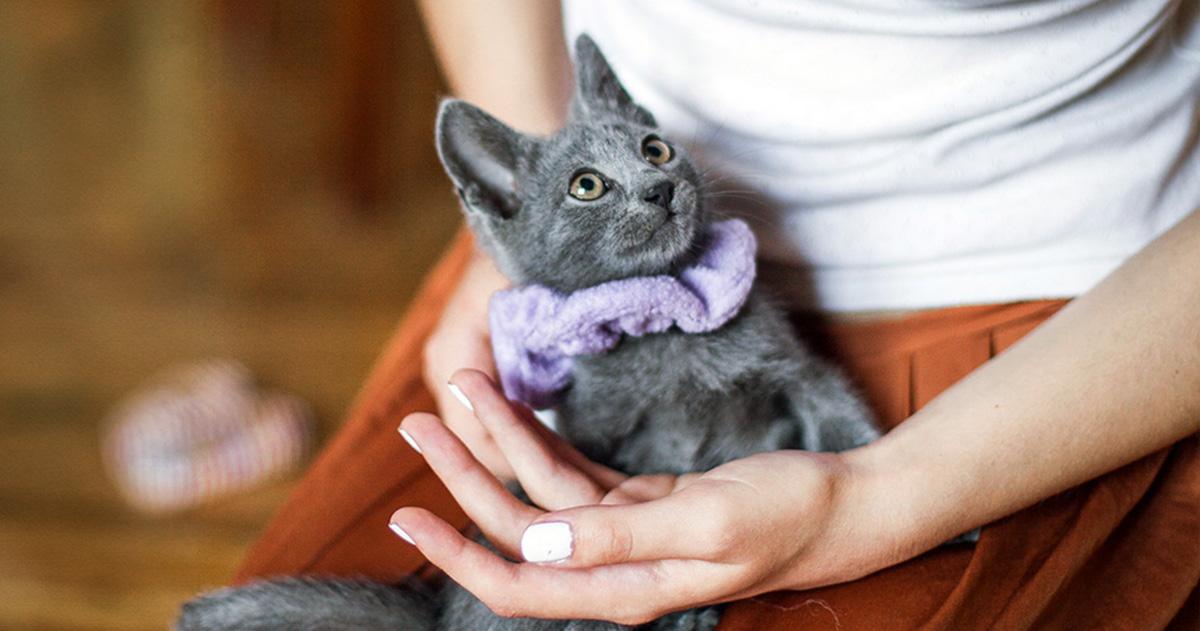How to Raise a Kitten: Tips for New Cat Parents
Stressed about raising your kitten? This guide has got you covered on everything you need to know to make sure your kitty is happy.
Stressed about raising your kitten? This guide has got you covered on everything you need to know to make sure your kitty is happy.
by Janelle Leeson, | March 1, 2024

AUDSHULE / Stocksy
If you’re reading this, chances are you’re thinking about getting a kitten. And congratulations, you are already on your way to being a good pet parent. Because putting in this early effort to properly train and care for your kitten will set them up to become well-adjusted cats.
The first step in welcoming your new kitten is to dedicate a room for them. That’s right, experts do not recommend your kitten having free reign of the house during their first few days home. Here’s how to set up this room.
Choose a small room or a section of a larger room that can be securely closed off. This will give your kitten a safe space to adjust to their new surroundings without feeling overwhelmed.
Make sure you have everything your kitten needs in their room before they arrive. This includes a low-entry litter box, food and water bowls, a scratching post, a bed, and toys. Also, don’t forget a secure carrier for the ride home from the rescue.
Take some time to walk around — even crawl on the floor — to identify any potential baby hazards. Things like exposed electrical cords, toxic plants, and small objects can get nibbled on.
If you have other pets, prepare them for your kitten’s arrival. Practice your pup's knowledge of “sit,” “stay,” and “leave it,” so they can give the kitten space to adjust and explore. Cats, meanwhile, are very territorial, notes Dr. Rachel Geller, Ed.D., a certified cat behavior and retention specialist. To avoid clashes in multicat households, she recommends making sure you have plenty of key resources, such as cat trees, scratching posts, and litter boxes.
Socialization means exposing your kitten to positive experiences with people, animals, sights, and sounds early in their development, when they’re most open to new things. By the time your kitten arrives home (probably at around eight weeks old), a good deal of socialization should have already occurred, thanks to their mom, littermates, and staff or volunteers at the shelter. But you’ll still have an important job to do.
It’s good for your kitten to be introduced to people of all genders, ages, and ethnicities. Encourage gentle handling of your kitten, using positive reinforcement like treats and playtime, to create healthy associations with humans. Inherited personality traits can influence a cat’s cuddliness, but positive experiences go a long way in raising a kitten to be social.
Supervised meet and greets with well-mannered pets can help your kitten learn positive social behavior. Start slow, and let your kitten approach these other animals at their own pace.
Start with gentle exposure to everyday objects like a vacuum cleaner, by beginning with the quietest setting and keeping it at a distance. Gradually increase the noise and closeness as your kitten shows more comfort, rewarding their bravery at every step. But desensitization isn’t just for loud, scary noises — expose your kitten to different textures, movements, and sounds using a variety of toys.
Shelters and rescues work hard to ensure adopted pets are healthy. In fact, newly adopted pets are often sent to their adoptive homes with microchips, with current vaccinations, after wellness exams, and after being spayed or neutered. But you’ll still want to schedule your first vet appointment shortly after bringing your kitten home to complete their core vaccinations and get connected with a nearby clinic.
Dr. Geller says you can expect your little one to pee after meals and poop up to three times a day (this will be less as they get older). Although you’ll be in charge of scooping the litter box, training your kitten to use it often requires less hands-on work than you’d think.
According to the American Animal Hospital Association (AAHA), cats are neat freaks naturally drawn to sandy substrates for relieving themselves. If they grew up with their mom and littermates, they should have plenty of litter-box experience by the time they arrive at their new home.
But burying their waste isn’t always a given. Dr. Geller assures us that it’s nothing to stress over. Some cats simply didn’t learn to bury their waste from their mom. Instead, focus on providing a comfortable, accessible litter-box experience.
Choose a litter box with a low entry, making it easy for your little-legged kitten to climb in and out.
Place the box away from their sleeping area, food, and water.
Opt for soft, sand-like litter that’s unscented. It might require trial and error to find the litter they prefer. Offering multiple litter types can make your cat more adaptable to changes as they get older, according to the AAHA.
One of the best ways to bond with your new kitten is to set aside time each day for interactive play. Cats are natural-born predators, so kittens love pouncing, bouncing, chasing, bunny-kicking, and biting their toys. This is also a great time to start laying down some ground rules and training your kitten to play nice.
Never use your hands or feet as toys, says Joey Lusvardi, a certified cat behavior consultant and owner of Class Act Cats. They’ll think that biting and ambushing human limbs is okay. If your kitten goes for your hand, let it go limp and calmly replace your hand with a toy. Reward your kitten for choosing the toy.
Positive-reinforcement training includes using treats, praise, and play to reward your kitten for wanted behaviors, like scratching their post rather than the couch. You’ll find that rewarding your cat for wanted behaviors goes a long way. This has a much better outcome than fear tactics like squirting cats with spray bottles (which no experts we’ve spoken to recommend).
Ultimately, proper training can be a win-win, because you’ll not only shape your kitten’s good behavior but also build a healthy relationship with them.
From adoption fees to food and veterinary care, pet parents in most parts of the country spend more than $1,000 a year on a single cat or kitten, according to a Pettable survey. That same poll found that Delaware topped out as the most expensive state to raise a kitten, with cat parents spending $2,820 annually.
The first year of kittenhood tends to be the most expensive, because you’ll be stocking up on new supplies. But ongoing costs like food, cat sitters, and veterinary visits can still add up over your cat’s lifetime. The good news is there are ways to cut pet care costs, such as using low-cost spay-and-neuter clinics and investing in pet insurance.
Here’s a breakdown of typical new-kitten expenses:
Adoption fee – $100 to $500
Vaccinations – $200 to $500
Wellness visit – $50 to $100
Spay/neuter surgery – $100 to $800
Microchip – $25 to $75, $50 on average
Initial supplies – $300 to $800
Some supplies include:
Bed – $25 to $100
Scratching post – $20 to $135
Cat tree – $50 to $150
Nail clippers – $5 to $30
Collar – $10 to $50
Toys – $10 to $50
Food and water bowls – $10 to $50
Kitten food – $30
Cat carrier – $40 to $200
Litter box – $25
Kitty litter – $25
Kittens require less constant care than puppies. Still, don’t be fooled by the “low-maintenance” assumptions. To raise healthy, happy kittens, you’ll need to put in time to socialize, train, and bond with them. You won’t be dealing with constant potty breaks and leash walks, but you will need to clean the litter box each day. Daily play is important, too. Between those sessions, it’s important that your kitten has access to scratching posts, cat trees, and other toys to prevent boredom-related mischief.
Start by asking questions while adopting your kitten. Genetics aren’t everything, so shelter and rescue staff may be able to provide insight into your kitten’s natural temperament. Socialization is the other key to raising a friendly kitten. Handling them with care from a young age and providing positive interactions will build trust, making them more receptive to handling and socializing as they grow. Avoid punishment. This can lead to fear or even aggression.
Your kitten’s first few days at home should be spent in a small, quiet room — like a spare bedroom, bathroom, or laundry room. Avoid any areas with high foot traffic or potential hazards. To keep them cozy, provide a cat bed, and even consider placing a worn clothing item with your scent nearby. Your kitten should also have access to their litter box and water.
Yes, it is. Kittens will be okay when left alone for the night in a kitten-proofed room with a litter box and water.
Caring for Kittens from Birth to Eight Weeks
Choosing and Caring for Your New Cat

Janelle Leeson is a Portland, Oregon-based freelance writer. Her work has been featured in magazines such as Inside Your Dog’s Mind, Inside Your Cat’s Mind, and Paw Print, as well online at Insider Reviews, NBC Select, Shop Today, PetMD, and Daily Paws. She has two adventure cats, a flock of urban chickens, and a soon-to-be-husband who doesn’t mind housing the occasional foster cat — or five.